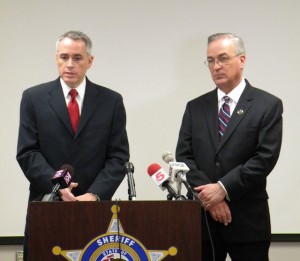Madison County State’s Attorney Tom Gibbons and Sheriff Bob Hertz called three suspected heroin overdose deaths within a six-hour period in the county last week a catalyst to action.

Madison County State’s Attorney Tom Gibbons (left) and Madison County Sheriff Bob Hertz / Photo by Roger Starkey
“Three deaths in one day, quite frankly, sends a message to a lot of people,” Hertz said.
Gibbons compared the moment to the overdose death of 17-year-old former Triad cheerleader Shannon Gaddis three years ago. Her death sent a clear message that heroin use in the area was a major problem, Gibbons said.
An initiative began after Gaddis’ died to prosecute individuals responsible for distributing drugs that result in death or great bodily harm. The deaths of Katie L. Keavy, 29, of Collinsville, Dearold W. Oseland, 38, of Roxana and Paul J. Simpson, 40, of Granite City prompted the creation of a Madison County task force to assess the status of the problem in the county and develop a plan of action.
From 2010 to 2013, there were 69 heroin deaths in Madison County. There were 18 in 2010 and seven in 2009. There have been 587 criminal charges in the county directly related to heroin since 2011. That figure does not count related crimes, such as burglary to support a habit.
State legislators, Hertz said, may take up the matter in the spring, but he and Gibbons are not willing to wait. A group that includes legislators that represent Madison County, Coroner Steve Nonn, U.S. Attorney Steve Wiggington, local police chiefs, addiction treatment providers, representatives from Madison County Probation and Drug Court, local healthcare providers and representatives from local law enforcement agencies have been asked to attend the first meeting of the task force on Feb. 28. Gibbons said the response to the invitation has been very positive.
The diverse group of invitees is needed because law enforcement alone cannot tackle the problem, Hertz said. “We can’t arrest ourselves out of this problem,” Hertz said.
The task force will host a public meeting at 1 p.m. March 1 in the Madison County Board room to get input from anyone in the public that is willing to provide insight. In particular, Hertz said, he would like to hear from victims who have survived and families of addicts
“A lot of people don’t want to talk about this,” Hertz said. “Former addicts do not want to talk to police.”
Public input will be combined with input from the task force members to create a concrete action plan. Gibbons knows the problem will not be resolved quickly.
“This is a problem that was more than 10 years in the making,” Gibbons said. “It’s going to take more than that to fix it.”



